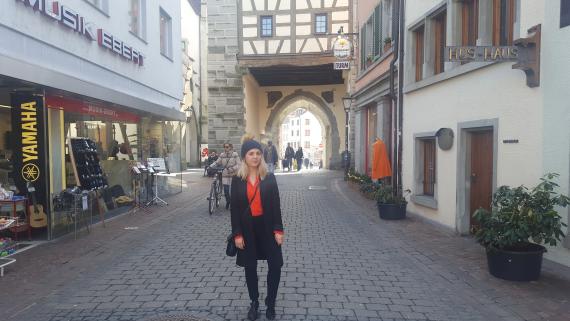I fell in love with Germany in 2012. I spent a total of 3 years in Germany and Austria before pursuing a degree in Gemanics and International Studies and I am hoping for many more. While working in Baden Württemberg, Germany and doing undergraduate research for the University of Washington I met my now boyfriend of one year! I truly believe anything and everything is possible and there is no better place to start with than learning a language.
As a DAAD scholar I am hoping to study Peace and Security at the University of Hamburg this fall. Drück mir die Daumen! If not my back up plan is to teach with Fulbright in Tyrol, Austria. My dream is to work for a German based non profit organization like Brot für die Welt.
Thank you to the German department for guidance and support and I hope to keep in touch through the years.
Hayley McCord's Commencement Speech
German is my superpower. My experience of German has been a journey of total immersion and total personal change, one that began in 2012 with a one-way ticket to Berlin and twenty dollars in my pocket, to a nearly three year stay in Germany and Austria, and eventually to two degrees in Germanics and International Studies from the University of Washington. It has been through the German language that I have had some of the most impactful experiences of my life and it has been my knowledge of the language that has enabled me to positively impact others. Speaking and understanding German has given me the opportunity to have a second identity if you will – to form friendships and relationships based in another language and another culture not my own. Most importantly, my “migration experience” to Germany, although comparatively untroubled, exposed me to the struggle of the foreigner to belong and gave me sympathy for the experience of the immigrant.
In spring 2016 I took Professor Jason Groves’ course “An Introduction to 20th Century Literature and Culture,“ which was organized around topics of migration, translation, and memory, and featured the multi-lingualism of the migrant through the work of Japanese author Yoko Tawada, the Turkish immigrant writer, director, and actress Emine Sevgi Özdamar, and Turkish-German filmmaker Fatih Akin. The topic of cross-cultural interactions within Germany piqued my interest and raised questions in my mind about race, the idea of states and nationalism, and ultimately highlighted the existential struggle of “der Fremde,” the foreigner, to belong in a culture and a country in which he or she was not born. This inquiry led me to research and present a German honor’s project entitled “Der Fremde: Immigrants to Germany Yesterday and Today” which was a comparison of the Turkish migration to Germany in the 1960s and 70s and the Syrian refugee crisis in 2015. I discovered that not only is integration complex and challenging, its very definition is changing in an ever more globalized world.
Summer 2016 I initiated an independent research project “From Immigration to Integration: German Reactions to the Refugee Crisis” in the Bodensee region in Baden-Württemberg, Germany. The project focused on the current tense political situation, the role of Islam in Germany, and future plans for refugee integration. I sought out candid German responses to the influx of refugees and the current, mainly volunteer effort being made to resettle and educate them in the absence of stronger governmental organization. Through interviews with non-profit organizations, churches, and colleagues, I heard that the process of integration involves support from the community with everyday activities such as learning how to ride a bike, cooking, and of course language classes. My knowledge of German put locals at ease and allowed them to communicate their fears and concerns about the uncertain future. As is often the case with research, the answers to my questions evolved and raised more questions about integration and became less about how the foreigner can fit in but about how both cultures can best fit together.
Simultaneously, I worked as an English and German instructor at the Carl Duisberg language school last summer. I broached the topic of refugees and immigrants with my students aged 10 to 15. Their responses to immigrants were warm and open-hearted. All students responded wholeheartedly to the idea of mailing postcards to Syrian refugee children still on the run and in camps. Although writing in English was still a challenge, each student used a separate piece of paper in order to formulate their message error-free. I was overwhelmed by their voices of hope and encouragement. My students showed me that integration begins in the hearts of a host country. It starts with a willingness to help and to accept.
Being German has come to mean and will continue to mean many things. There are similarities between the birth pains in Germany right now and social and racial tensions we are experiencing here in the United States. Our world is becoming less about ethnic heritage and nation states and more about cultures of shared ideals and dreams which emphasizes ever more strongly the pressing need to overcome inequality and injustice. This is why language is so important. Because as global citizens we need to be able to communicate with each other to bridge social and economic divides and to meet common goals. This is something that even people with the same mother tongue often struggle to do.
To the Class of 2017: We have mastered one of the most difficult languages in the world. Learning a foreign language is one of the most useful things we can do to broaden our empathy and develop our cultural sensitivity. Let’s use our super power to listen and then to speak. But most of all to understand.
